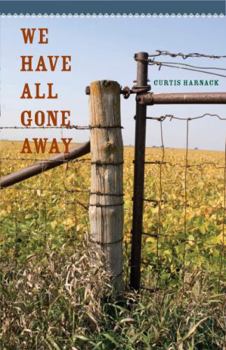We Have All Gone Away
Select Format
Select Condition 
Book Overview
In We Have All Gone Away, his emotionally moving memoir, Curtis Harnack tells of growing up during the Great Depression on an Iowa farm among six siblings and an extended family of relatives. With a directness and a beauty that recall Thoreau, Harnack balances a child's impressions with the knowledge of an adult looking back to produce what Publishers Weekly called "a country plum of a book, written with genuine affection and...
Format:Paperback
Language:English
ISBN:1587299690
ISBN13:9781587299698
Release Date:May 2011
Publisher:University of Iowa Press
Length:188 Pages
Weight:1.50 lbs.
Dimensions:0.6" x 5.5" x 8.2"
Related Subjects
Biographical Biographies Biographies & History Biography & History Literature & FictionCustomer Reviews
3 ratings
EXcellent book; EXcelent writing; LOVED it!
Published by Thriftbooks.com User , 15 years ago
Man, this was just such an absorbing, well-written book that I hardly know where to begin. I found so much here that I could relate to, and I didn't even grow up on a farm, although my grandpa's small "hobby" farm was next door and I got medium-sized "tastes" of what it was like to be a farm boy between the ages of nine and eighteen, when I finished high school and joined the army. And my "pseudo" farm boy experiences served me well for the rest of my life. Because Harnack makes it clear in his book how important the work, discipline and seasonal rhythms of farm life was in his own maturation. But at the same time, as the title implies, he was also stretching toward a future that would not actively include the farm where he was raised. His college-educated widowed mother was adamant that all four of her children would reach higher than the life of a farmer, and they all did. But, in the meantime, as I read through this book I had to keep stopping and would silently exclaim to myself, "Yes! That's exactly how it was!" Or almost, at any rate. As an example, Harnack describes a fishing trip where his Uncle Jack takes the whole tribe of siblings and cousins to catch "bullheads." Their expedition is successful and they have a feast that first night - "The white sweet flesh was rather mealy, delicately fish-flavored. We were told - and knew - that we were privileged to be eating a truly rare delicacy; we savored each morsel and sucked the spines." I was never fond of fishing as a kid, and only went with my dad a couple of times. But Dad loved to fish and often brought home a mixed mess of bluegills, lake perch and sunfish, which he cleaned and fileted for a sumptuous feast cooked by Mom in the same way Harnack describes. Our lakeside neighbor favored bass, both as a game fish and a delicacy. But he and my dad were unanimous in their opinion that bullheads, bottom-feeding suckers, were trash fish, and always threw them back when they happened to catch them. A perhaps minor, but interesting distinction between my childhood and Harnack's. His other tales of cows, pigs and chickens - gathering, candling, cleaning and bartering eggs - all ring true to my own memories, although I will freely admit I never had all the responsibilities and heavy labor that Harnack and his siblings and cousins bore. His descriptions of the barns that his grandfather built and and how they were, in many ways, the center of life on a farm, reminded me of Anne-Marie Oomen's wonderful memoir, PULLING DOWN THE BARN, in which she characterized her family's barn as cathedral-like and absolutely central to their life. Harnack's book also brought to mind another memoir, EIGHTY ACRES: ELEGY FOR A FAMILY FARM, by Ron Jager, who grew up near McBain, Michigan, less than an hour from my own childhood home, here in Reed City. Harnack's depiction of the strict separation of the various religions in his small town also rang true for me, causing me to remember how the nuns who taught us in t
Nostalgia run riot
Published by Thriftbooks.com User , 24 years ago
Anyone who grew up on a farm will be entranced by this book, and if you grew up on an Iowa farm you will be overjoyed. This book has a series of 12 vignettes of growing up on a farm in the area of Remsen, Iowa in the 1930s. there is a great deal of authenticity, tho maybe more bitterness than I feel is warranted. But the book is one to be savored by those with similar memories.
An evocative memory of the midwestern family farm.
Published by Thriftbooks.com User , 26 years ago
Curtis Harnack's "We Have All Gone Away" captures with poignant beauty and sadness the end of a period of our country's history -- the family farm. In a heart-felt memoir of his family's farm in Iowa, a way of life gone forever is brought to life. Mr. Harnack could have been describing my own family's history in Indiana and when I first discovered the book in the 1980's, I read the book on tape for my Aunt and Uncle, then in their 80's, because their way of life was by then a thing of the past. "We Have All Gone Away" becomes a memorial for all who contributed to the rich fabric of our agricultural ecomony in a much simpler time.The book, which reads like good fiction, paints the powerful picture of a proud chapter in our country's growth. While the book doesn't spare the reader the full impact on individual lives as a result of agricultural expansion into big business, nor does Mr. Harnack wallow in the necessary demise of era.I shared the book with my daughter some years ago. She has passed the book on to more than a dozen people, all who share some remnant of a memory of our midwestern farming heritage. What a treasure this book is! I hope it never goes out of print.





